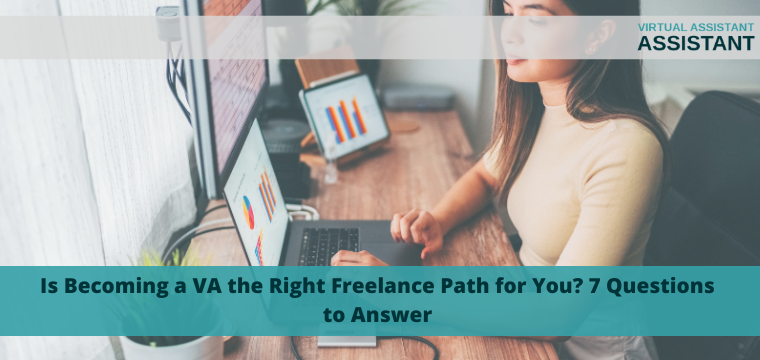 Is Becoming a VA the Right Freelance Path for You? 7 Questions to Answer
Is Becoming a VA the Right Freelance Path for You? 7 Questions to Answer
Over the past decade, the virtual assistant (VA) industry has rapidly grown in the Philippines, evolving from a niche role into a mainstream career path for many Filipinos. While the prospect is exciting for those looking to start their freelance journey, it’s important to recognize that being a VA comes with its own set of challenges, like managing and converting your earnings from foreign clients. Thankfully, digital tools like e-wallets now offer features tailored to freelancers, such as Maya’s free PayPal to Maya transfers, making salary handling much smoother.
That said, becoming a VA isn’t a decision to rush into. It’s important to take a step back and ask yourself a few key questions to better understand what the work involves and whether it aligns with your goals and lifestyle. To help you gain that clarity, here are some important questions you can reflect on, giving you a clearer picture of whether this particular freelance path is the right fit for you:
Table of Contents
1) Do I Have the Skills Required to Be a VA?
Being a VA usually means juggling a variety of tasks, ranging from managing emails and calendars to handling social media or even basic bookkeeping. Knowing whether you already have these skills, or are willing to pick them up, helps you figure out what kind of work you can confidently take on. If you have some of these skills or a strong desire to learn, you’re already off to a great start.
Keep in mind that many skills needed to be a VA can be learned along the way. There are plenty of online courses and resources that can help you build what you need, so don’t let a lack of experience hold you back if you’re motivated to grow.
2) Am I Comfortable Working Independently and Managing My Own Schedule?
As a VA, you’ll often be working remotely without direct supervision. That means managing your time well, meeting deadlines, and staying motivated on your own are all essential parts of the job. If you enjoy having control over your workday and can stay organized, this could be a great fit.
However, if you’re used to a more structured environment with close supervision, it might take some adjustment. Learning to stay disciplined and motivated on your own is part of the freelance journey, and it can be really rewarding once you get the hang of it.
3) Do I Have the Right Workspace and Tools to Work Remotely?
To work effectively as a VA, having a quiet, comfortable workspace and a reliable internet connection is a must. You’ll also need basic equipment like a computer with decent specs and noise-canceling headphones to ensure smooth communication with clients. If you can set this up at home, you’ll be in a stronger position to stay focused and deliver quality work without unnecessary distractions.
If your current space or tools aren’t quite there yet, it’s worth thinking about what you might need to invest in or improve. Sometimes, even small changes like finding a quieter corner or upgrading your internet plan can make a big difference in your productivity.
4) How Well Do I Handle Communication and Customer Service?
A big part of being a VA involves communicating clearly and professionally with clients, whether by email, phone, or chat. If you’re comfortable expressing yourself and handling questions or feedback calmly, that will help you build strong working relationships.
If communication isn’t your strongest skill, don’t worry, as it’s something you can improve with practice. You can also choose VA roles that require less direct interaction if that feels like a better fit, all while you build confidence.
5) Am I Ready to Market Myself and Find Clients?
Freelancers often need to promote their services and find clients, which means getting comfortable with networking and self-promotion. If you’re proactive about reaching out and showcasing what you can offer, you’ll have an easier time growing your VA business.
Understandably, marketing yourself can feel intimidating at first. You can ease into it by building a simple online presence, asking past colleagues or contacts for referrals, or working with agencies that connect VAs with clients. Over time, as you gain experience and confidence, putting yourself out there will start to feel more natural.
6) Do I Have Realistic Expectations About Income and Workload?
In the beginning, working as a freelancer can be unpredictable. It will likely take some time to build a steady client base and reach your desired income bracket. Knowing this helps you prepare financially and avoid frustration along the way.
Having realistic expectations also means planning ahead, whether that’s keeping a part-time job while you grow your VA business or setting savings goals to help you through slow periods. Patience and persistence are key to turning virtual assistant work into a stable, long-term source of income.
7) How Much Do I Value Work-Life Balance and Flexibility?
One of the biggest perks of being a VA is the flexibility to work from anywhere, often on your own schedule. If having control over your time and environment matters to you, this career path can significantly enhance your work-life balance.
However, this flexibility can sometimes blur the boundaries between work and personal life. Setting clear limits and establishing daily routines will help you stay productive without allowing work to spill into your off-hours.
With the help of the questions above, you can gain clearer insight into whether a VA career truly aligns with your priorities and the way you want to work. It’s not just about having the necessary skills but also about understanding the kind of freelance life you want to create. Take your time, trust the process, and remember that the best path is the one that feels right for you.
